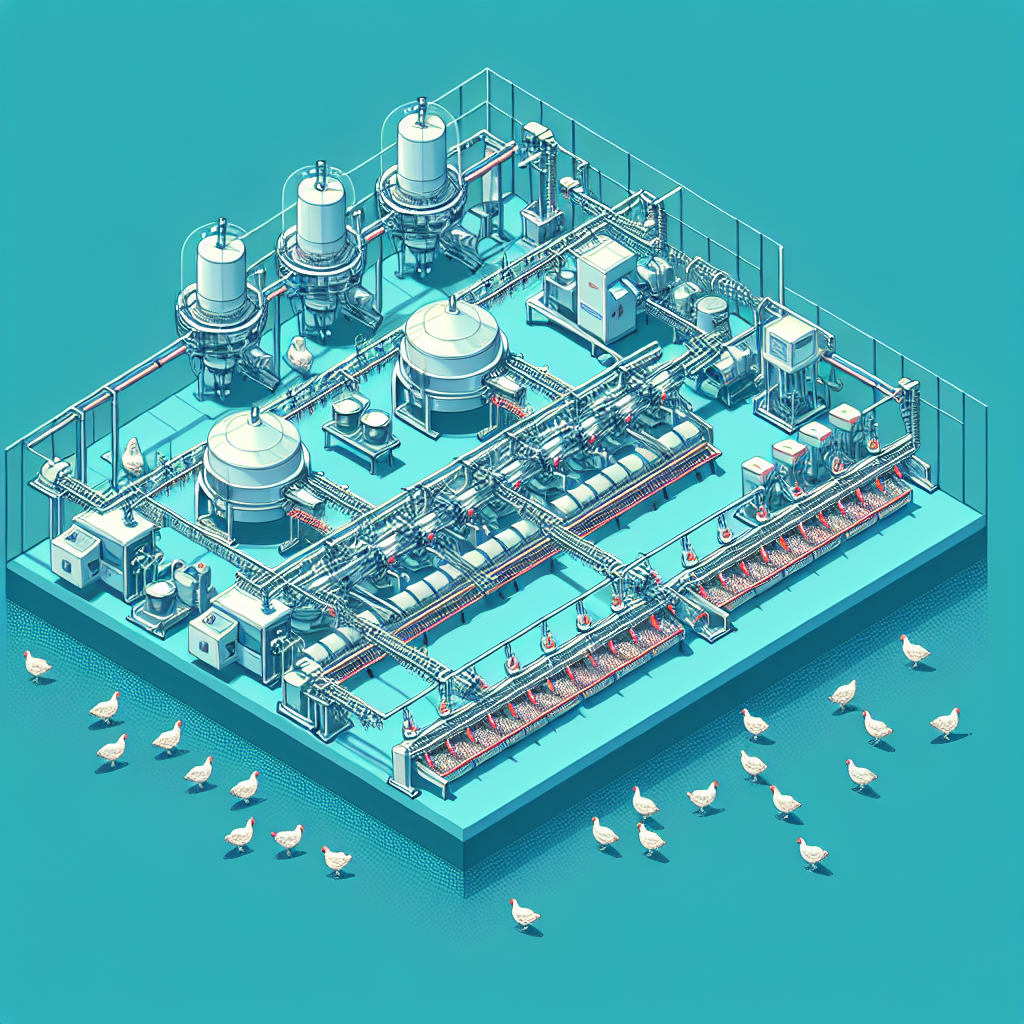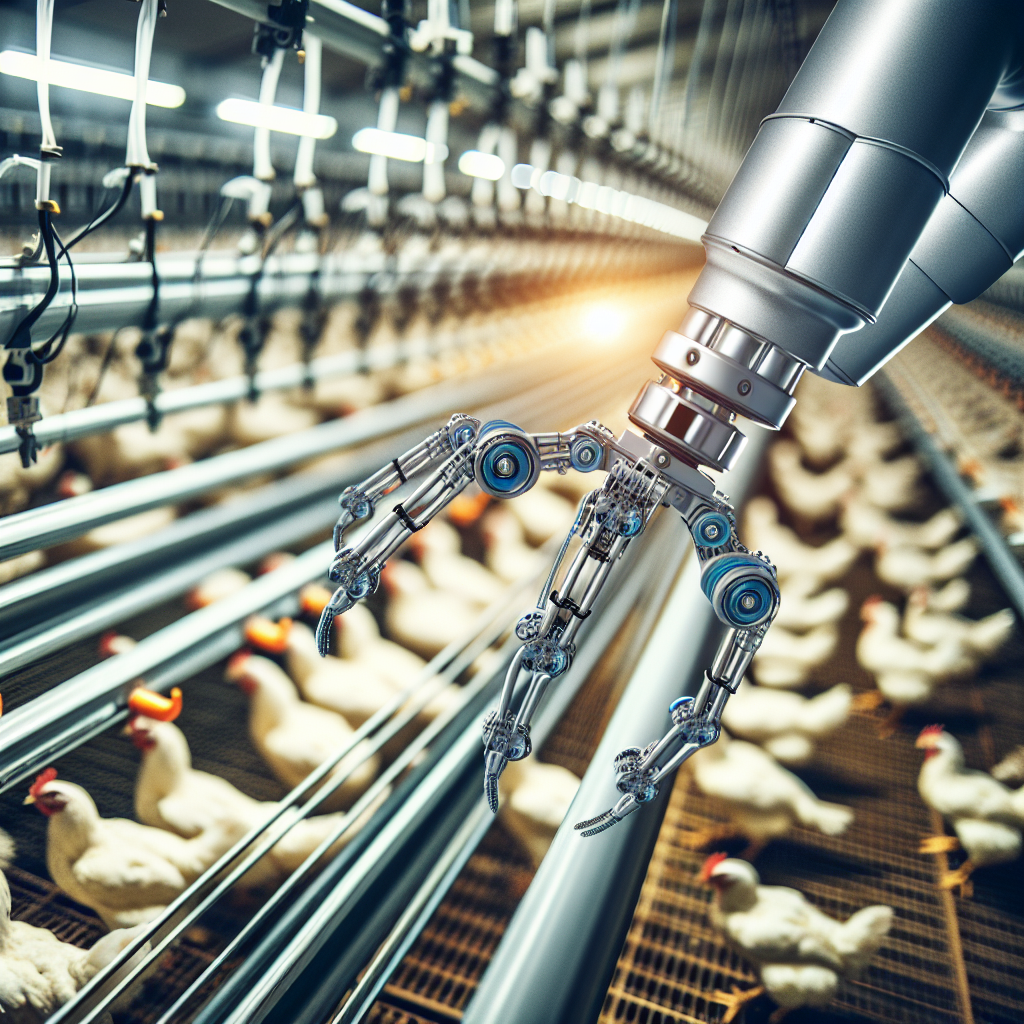In today’s world where ethical practices are a growing concern, the question arises: can technology lend a helping hand in ensuring ethical practices in chicken care and management? As our society becomes more conscious of the impact our choices have on the environment and animal welfare, technology has the potential to play a crucial role in providing innovative solutions. By harnessing the power of technology, we can reshape the way chickens are cared for, promoting sustainable and humane practices. This article explores the possibilities of using technology to create a better future for chicken care and management, where ethics and efficiency go hand in hand.
The Importance of Ethical Practices in Chicken Care and Management
Understanding the Current Challenges
Chicken care and management is a vital aspect of poultry farming. Ethical practices in this field are crucial for ensuring the well-being of the chickens, protecting their health, and maintaining high-quality egg and meat production. However, there are various challenges that poultry farmers face in achieving these ethical practices. These challenges include balancing the needs of large-scale production with individual chicken welfare, preventing the spread of diseases, and implementing environmentally sustainable practices. It is necessary to address these challenges to promote ethically responsible chicken care and management.
The Consequences of Unethical Practices
Unethical practices in chicken care and management can have far-reaching consequences. When chickens are subjected to poor living conditions, inadequate nutrition, or overcrowded environments, not only does their welfare suffer, but it can also impact their health and productivity. Chickens experiencing stress or discomfort may become more susceptible to diseases, leading to higher mortality rates and antibiotic usage. Additionally, the quality of the eggs and meat produced may also be compromised. Unethical practices not only harm the chickens themselves but can also tarnish the reputation of poultry farms and impact consumer trust. Therefore, it is essential to employ ethical practices to ensure the well-being of chickens and the sustainable success of poultry farming.
An Overview of Technology’s Role in Chicken Care and Management
Advancements in Farm Monitoring Systems
Technology has revolutionized the way chicken care and management are conducted. Farm monitoring systems equipped with real-time video surveillance and environmental monitoring sensors enable farmers to have a comprehensive understanding of the chickens’ living conditions. These systems allow for immediate detection of potential issues such as temperature fluctuations, air quality problems, or signs of distress among the chickens. By continuously monitoring the farm environment, farmers can address any concerns promptly, ensuring optimal conditions for the chickens and maintaining their welfare.
Automated Feeding and Watering Systems
Automated feeding and watering systems have greatly improved the efficiency and accuracy of providing nutrition to chickens. Precision feeding techniques allow for individualized feeding plans based on the unique nutritional needs of each chicken. By precisely measuring and dispensing feed, these systems help prevent overfeeding or underfeeding, ensuring healthy growth and minimizing waste. Additionally, water quality monitoring and management systems ensure a clean and accessible water supply, which is essential for the well-being of chickens. These automated systems contribute to ethical practices by optimizing nutrition and maintaining proper hydration for the chickens.
Smart Coops and Climate Control
Smart coops equipped with advanced technology enable poultry farmers to create optimal living conditions for their chickens. Optimized lighting and ventilation systems ensure chickens receive sufficient light and fresh air, promoting their physical and mental well-being. These systems can be programmed to mimic natural daylight patterns and regulate temperature and humidity levels. Automated nesting and egg collection systems provide comfortable and secure spaces for chickens to lay eggs, preventing stress and potential damage to the eggs. By utilizing smart coops and climate control technology, farmers can create an environment that enhances chicken welfare and supports ethical practices.
GPS Tracking and Geofencing for Free-Range Chickens
Free-range chickens require sufficient space to roam and express natural behaviors. GPS tracking and geofencing technologies play a crucial role in ensuring that chickens have access to the appropriate outdoor areas while still remaining within safe boundaries. GPS tracking allows farmers to monitor the movements of free-range chickens, ensuring that they have ample space to explore and engage in natural behaviors. Geofencing technology helps prevent chickens from straying into unsafe or restricted areas. These technologies enable farmers to provide a free-range environment that promotes the well-being of the chickens while ensuring their safety and preventing potential harm.
Sensor Technology for Health Monitoring
Regular health monitoring is essential for identifying potential health issues before they become severe. Sensor technology has greatly facilitated health monitoring in chickens. Activity and behavior analysis systems can detect any abnormalities in the chickens’ movement or behavior patterns, alerting farmers to potential health concerns. Early disease detection is crucial for prompt intervention and treatment. Sensor technology can detect early symptoms of diseases, enabling timely action and minimizing the spread of infections. Furthermore, sensor technology helps optimize medication and treatment by tracking the chickens’ response to medication and adjusting dosage accordingly. These advancements in health monitoring technology contribute to the ethical care and management of chickens by ensuring early intervention and promoting overall flock health.
Data Analytics and Artificial Intelligence
The abundance of data collected from various technologies in chicken care and management can be harnessed through data analytics and artificial intelligence (AI). By analyzing data patterns and trends, farmers can gain valuable insights into the chickens’ health, well-being, and productivity. Predictive analysis can predict potential health issues or growth problems, allowing farmers to take proactive measures. Automated decision-making systems based on AI can optimize feed management, ensuring chickens receive appropriate nutrition at the right time. Furthermore, data analytics can enhance breeding programs by analyzing genetic information, improving the overall quality and productivity of the flock. The integration of data analytics and AI in chicken care and management enhances ethical practices by enabling informed decision-making and maximizing the chickens’ welfare and productivity.
Farm Monitoring Systems for Ensuring Ethical Practices
Real-Time Video Surveillance
Farm monitoring systems equipped with real-time video surveillance allow farmers to have constant visual access to the chickens’ living conditions. This technology enables farmers to monitor flock behavior, identify signs of distress or aggression, and ensure that chickens have access to clean water and feed. Real-time video surveillance helps maintain ethical practices by allowing prompt intervention in case of any abnormality or welfare issue.
Environmental Monitoring
Environmental monitoring sensors provide valuable data on temperature, humidity, and air quality within the chicken housing areas. Farmers can set optimal parameters for these variables, ensuring a comfortable and healthy environment for the chickens. Environmental monitoring systems contribute to ethical practices by enabling farmers to detect and address any potential environmental issues that may affect the welfare of the chickens.
Data Integration and Analysis
Farm monitoring systems collect vast amounts of data related to the chickens’ living conditions, behavior, and health. By integrating and analyzing this data, farmers can gain valuable insights into the overall welfare of the flock. Data analytics help identify patterns or trends that may indicate a need for intervention or adjustments in management practices. By leveraging data integration and analysis, farmers can ensure ethical practices by making informed decisions to enhance the well-being of the chickens.
Automated Feeding and Watering Systems
Precision Feeding Techniques
Automated feeding systems can be programmed to deliver precise amounts of feed based on each chicken’s individual nutritional needs. Precision feeding techniques help prevent overfeeding or underfeeding, optimizing nutrition and promoting healthy growth. By providing chickens with the appropriate nutrients in the right quantities, automated feeding systems contribute to ethical practices by ensuring the chickens’ well-being and minimizing wastage.
Water Quality Monitoring and Management
Automated watering systems coupled with water quality monitoring can ensure a clean and accessible water supply for the chickens. Clean water is essential for the chickens’ hydration and overall health. By continuously monitoring water quality and adjusting filtration or treatment systems as needed, farmers can provide a healthy water supply that supports ethical practices.
Smart Coops and Climate Control
Optimized Lighting and Ventilation
Smart coops equipped with optimized lighting systems can provide chickens with the right amount and quality of light for their well-being. Natural daylight patterns can be replicated, ensuring the chickens’ circadian rhythm is maintained. Ventilation systems complement the lighting by regulating temperature and air exchange, preventing the buildup of harmful gases and ensuring fresh air circulation. The combination of optimized lighting and ventilation contributes to ethical practices by creating an environment that promotes the chickens’ physical and mental well-being.
Automated Nesting and Egg Collection
Automated nesting systems provide comfortable and secure spaces for chickens to lay their eggs. These systems help prevent eggs from being damaged or contaminated, ensuring high-quality eggs for consumption. Automated egg collection systems minimize human intervention, reducing the chances of stress or harm to the chickens. By providing chickens with optimal nesting conditions and automating the egg collection process, smart coops contribute to ethical practices in chicken care and management.
GPS Tracking and Geofencing for Free-Range Chickens
Tracking Chicken Movements
GPS tracking technology allows farmers to monitor the movements of free-range chickens. By knowing the chickens’ location, farmers can ensure that they have sufficient space to roam and engage in natural behaviors. This tracking technology enables farmers to identify any territorial disputes or overcrowding, intervening if necessary to prevent stress or aggression among the chickens.
Ensuring Adequate Space for Roaming
Geofencing technology helps farmers establish safe and appropriate boundaries for free-range chickens. By creating virtual fences using GPS coordinates, farmers can prevent chickens from wandering into unsafe areas or straying too far from the designated free-range space. Ensuring adequate space for roaming contributes to ethical practices and supports the well-being of the free-range chickens.
Sensor Technology for Health Monitoring
Activity and Behavior Analysis
Sensor technology enables the monitoring of chickens’ activity levels and behavior patterns. Any significant changes or abnormalities in activity or behavior can indicate potential health issues. By analyzing these patterns, farmers can identify early signs of illness or distress and take prompt action to ensure the chickens’ health and well-being.
Early Disease Detection
Sensor technology can detect early symptoms of diseases, such as changes in body temperature or irregular feeding behaviors. Early detection allows for timely intervention and treatment, reducing the risk of severe illness or disease outbreaks. By leveraging sensor technology for early disease detection, farmers can preserve the health of their chickens and prevent the spread of infections among the flock.
Optimizing Medication and Treatment
Sensor technology can also monitor the response of chickens to medications and treatments. By tracking biological indicators or behavior patterns, farmers can assess the effectiveness of medications and adjust dosages accordingly. This optimization promotes ethical practices by minimizing unnecessary medication usage and ensuring appropriate treatment for individual chickens.
Data Analytics and Artificial Intelligence in Chicken Care
Predictive Analysis for Ensuring Optimal Health and Growth
Data analytics and AI can be utilized to analyze patterns and trends in the chickens’ health and growth data. Predictive analysis can identify potential health issues or growth problems before they become severe. By incorporating predictive analysis into chicken care and management, farmers can take proactive measures to ensure the optimal health and growth of their flocks.
Automated Decision-Making for Feed Management
Automated decision-making systems based on AI algorithms can optimize feed management for chickens. By analyzing the chickens’ nutritional needs, growth rates, and environmental factors, these systems can determine the most appropriate feed compositions and feeding schedules. Automated decision-making enhances ethical practices by ensuring that each chicken receives an optimal diet tailored to its individual needs.
Enhancing Breeding Programs
Data analytics combined with genetic information can facilitate the enhancement of breeding programs. By analyzing genetic data from the flock, farmers can identify desirable traits and make informed decisions regarding breeding selection. This optimization of breeding programs promotes the overall quality and productivity of the flock while considering ethical considerations and the welfare of the chickens.
Technology’s Impact on Chicken Welfare Certification and Auditing
Streamlining Ethical Certification Processes
Technology can streamline the certification processes for chicken welfare. By providing real-time data and evidence of adherence to ethical practices, farm monitoring systems and other technological solutions can simplify the certification process. This streamlining helps promote transparency and accountability in the chicken care industry, ensuring that certified farms meet the required ethical standards.
Facilitating Transparent Auditing and Compliance
Technological advancements enable transparent auditing and compliance monitoring in chicken care and management. By providing accurate and accessible data on various aspects such as living conditions, feeding practices, and health monitoring, technology assists auditors in evaluating the adherence to ethical practices. The transparency facilitated by technology enhances accountability and ensures that ethical standards are met to safeguard chicken welfare.
The Potential Challenges and Considerations
Affordability and Accessibility
While technology offers numerous benefits in enhancing ethical practices in chicken care and management, there are potential challenges to consider. Affordability and accessibility of advanced technologies may pose obstacles for small-scale or resource-constrained poultry farms. Implementing and maintaining advanced technological systems can be costly, requiring initial investments and ongoing expenses. Ensuring the affordability and accessibility of these technologies for all poultry farmers is crucial to promote widespread adoption and the ethical advancement of the industry.
Data Privacy and Security
The collection and utilization of large amounts of data in chicken care and management raise concerns about privacy and security. Farmers must handle data responsibly, ensuring that sensitive information is protected and used solely for the intended purposes. Robust security measures must be in place to safeguard data from unauthorized access or breaches. Addressing these concerns is essential to maintain trust and confidence in the use of technology for ethical practices in chicken care.
Interpreting Behavioral Patterns Effectively
Interpreting behavioral patterns of chickens accurately can be challenging due to the complexity of their natural behaviors. Technology must be capable of recognizing and understanding the variety of behaviors exhibited by chickens and differentiating between normal and abnormal behaviors. Advancements in artificial intelligence and machine learning algorithms are instrumental in improving the accuracy and reliability of behavioral pattern interpretation. Continual refinement of technology and collaboration between poultry experts and technology developers are necessary to ensure the effective interpretation of behavioral patterns for ethical chicken care.
In conclusion, technology plays a vital role in ensuring ethical practices in chicken care and management. Advancements in farm monitoring systems, automated feeding and watering systems, smart coops and climate control, GPS tracking and geofencing, sensor technology for health monitoring, and data analytics with artificial intelligence are transforming the poultry industry. These technologies contribute to enhanced chicken welfare, disease prevention, optimal nutrition, and responsible breeding programs. Moreover, technology facilitates ethical certification processes, auditing, and compliance monitoring. However, challenges such as affordability, data privacy, and accurately interpreting behavioral patterns must be addressed to ensure the widespread access and effective utilization of technology for ethical practices in chicken care. With continued innovation and collaboration, technology can empower poultry farmers to achieve and maintain high ethical standards while ensuring the welfare and productivity of their flocks.




